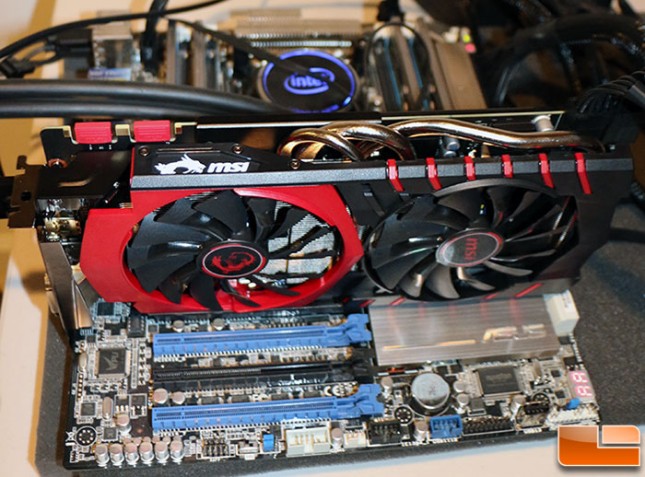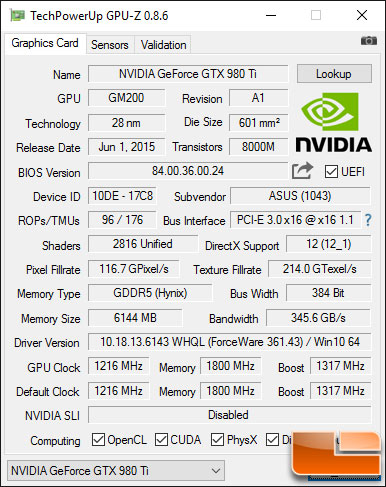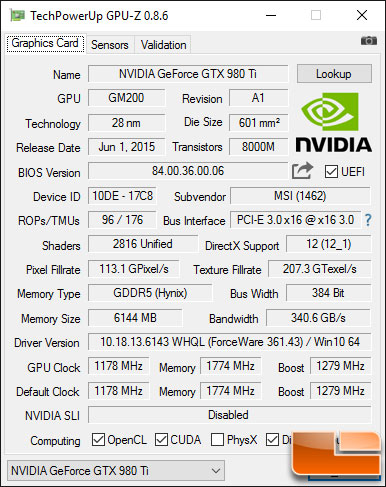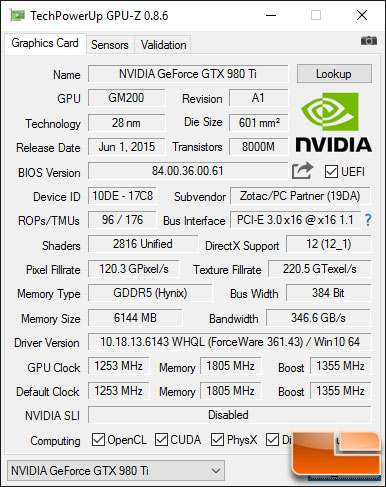NVIDIA GeForce GTX 980 Ti Video Card Roundup ASUS, MSI and Zotac
Test System
Before we look at the numbers, let’s take a brief look at the test system that was used. All testing was done using a fresh install of Windows 10 Pro 64-bit and benchmarks were completed on the desktop with no other software programs running. There has been some concern of people testing a cold card versus a hot card, but we’ve always done out testing ‘hot’ since the site started back more than a decade ago.
Video Cards & Drivers used for testing:
- AMD Crimson 15.12
- NVIDIA GeForce 361.43
Intel X79/LGA2011 Platform
The Intel X79 platform that we used to test the all of the video cards was running the ASUS P9X79-E WS motherboard with BIOS 1704 that came out on 05/08/2015. We went with the Intel Core i7-4960X Ivy Bridge-E processor to power this platform as it is PCIe 3.0 certified, so all graphics cards are tested with PCI Express Gen 3 enabled. The Kingston HyperX 10th Anniversary 16GB 2400MHz quad channel memory kit was set to XMP Profile #2. This profile defaults to 2133MHz with 1.65v and 11-13-13-30 2T memory timings. The OCZ Vertex 460 240GB SSD was run with latest firmware available. A Corsair AX860i digital power supply provides clean power to the system and is also silent as the fan hardly ever spins up. This is critical to our testing as it lowers the ambient noise level of the room and gives us more accurate sound measurements.
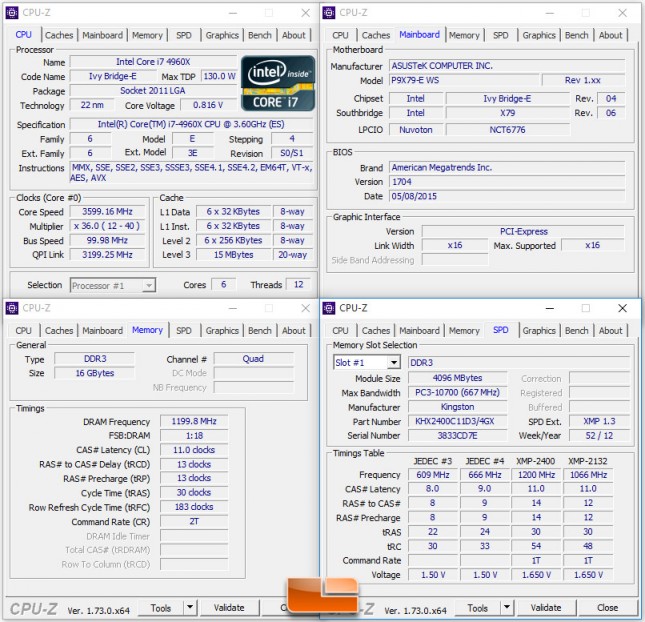
Here are the exact hardware components that we are using on our test system:
| The Intel X79 Test Platform | |||||
|---|---|---|---|---|---|
|
Component |
Brand/Model |
Live Pricing |
|||
| Processor | Intel Core i7-4960X | ||||
| Motherboard |
ASUS P9X79-E WS
|
||||
| Memory |
16GB Kingston 2133MHz
|
||||
| Video Card | Various | ||||
| Solid-State Drive | OCZ Vertex 460 240GB | ||||
| Cooling | Intel TS13X (Asetek) | ||||
| Power Supply | Corsair AX860i | ||||
| Operating System | Windows 10 64-bit | ||||
| Monitor | Sharp PN-K321 32″ 4K | ||||
ASUS GeForce GTX 980 Ti STRIX Gaming 6GB Video Card GPU-Z Info:
MSI GeForce GTX 980Ti Gaming 6GB Video Card GPU-Z Info:
Zotac GeForce GTX 980 Ti AMP! Extreme Edition GPU-Z Info:
| GPU base clock (MHz) |
GPU boost clock (MHz) |
Memory speed (MHz) |
Idle GPU Voltage |
Load GPU Voltage |
Gaming GPU clock (MHz) |
|
| ASUS GeForce GTX 980 Ti STRIX OC 6GB | 1216 | 1317 | 7200 | 0.861 | 1.193 | 1379.5 (+63) |
| MSI GeForce GTX 980 Ti Gaming 6GB | 1178 | 1279 | 7096 | 0.881 | 1.199 | 1354.2 (+75) |
| Zotac GeForce GTX 980 Ti AMP! 6GB | 1253 | 1355 | 7220 | 0.868 | 1.193 | 1442.8 (+88) |
Before we get into the test results here are the clock speeds of each card and finally their observed voltages and peak core clock that were shown in GPU-Z 0.8.6 while we were running the benchmarks. The cards boost clock is not the maximum clock speed that the card will run at and thanks to NVIDIA’s GPU Boost 2.0 algorithm you’ll see cards able to go well beyond the rated clock speeds if the parameters are right. This is where a better GPU cooler might come into play as it should allow for higher boost clock speeds. All of the peak clocks we recorded when gaming were 63MHz to 88MHz faster than the cards advertised GPU Boost clocks. Keep this in mind when looking at the performance charts on the following pages.
Let’s move on to the Battlefield 4 benchmark results!

